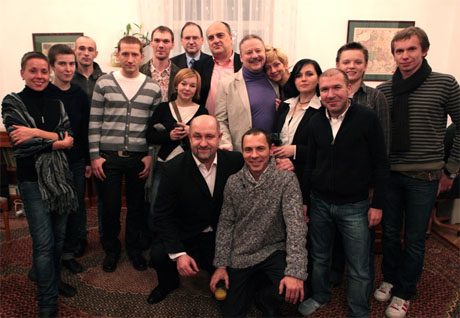Nuremberg of one's own volition
20- 20.11.2009, 18:01
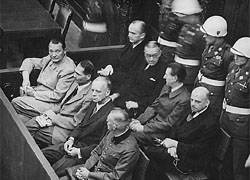
Officers of secret services, riot policemen, corrupt officials and regime careerists, who committed crimes against their nation under dictatorships, will they be punished?
This problem is also urgent for today’s Belarus. It has been touched upon in the play “Nuremberg” by Polish playwright Wojciech Tomczyk. The play was written 6 years ago, and was translated into Belarusian and Russian by Belarus Free Theatre. Ambassador of Poland in Belarus Henryk Litwin has attracted attention of the theatre to this play. Polish Embassy has also organized visit of Wojciech Tomczyk to Belarus. On November 18 in the building of the diplomatic mission a landmark event took place, a reading of the play, “Nuremberg”, by actors of the Free Theatre Aleh Sidorchyk, Maryna Yurevich and Yana Rusakevich under direction of Mikalai Khalezin.
The first reading of the play in Belarus was held in presence of representatives of the diplomatic missions of the EU countries, including Henryk Litvin, Hungarian Ambassador Ferenc Kontra, Ukrainian Ambassador Ihor Lykhovoy, Chargé d'affaires of the Delegation of the European Commission to Belarus Jean-Eric Holzapfel. Coordinator of the civil campaign “European Belarus” Andrei Sannikov, film director Yury Khashchavatski, Charter’97 coordinator Zmitser Bandarenka, a well-known journalist Iryna Khalip and other representatives of the democratic community of Belarus were also invited to the embassy.
The amazing text of the Polish playwright of tremendous current interest for the post-Soviet space was a great success. The play is based upon real stories. The television drama has become a cult work of recent years in Poland.
The protagonist of the play, a colonel of secret services who meets a young journalist and asks her to initiate a Nuremberg process over… himself. By the words of his character Wojciech Tomczyk describes awful crimes committed by the authorities of Communist Poland: cruel repressions against activists of Solidarity trade union, murders and kidnapping, tortures and humiliating treatment of dissenters in prisons, provocations of secret services, targeting of people and making them to commit suicide, impenetrable censorship in the press and literature, mass denunciations and treachery in “the name of the Polish People’s Republic”.
Many things from the play are painfully familiar to Belarusians. For instance, the people who have endured imprisonment for their political views or took part in peaceful protests in Belarus: “Tortures in underground stories of secret services were more refined than in Gestapo. I know what I’m talking about, I know people who carried out tortures both here and there. And riot police?! Riot policemen felt adequate only when they were shouted in their faces: Gestapo! Gestapo!”…
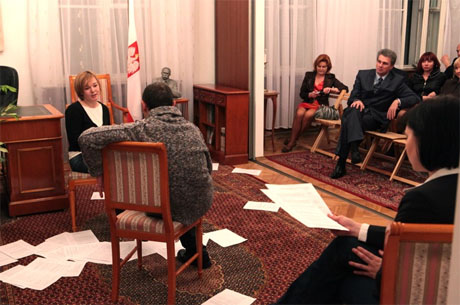
And these words of a Polish colonel addressed to their fellow countrymen can easily be addressed to high-ranking Belarusians who hide rigging elections results, make criminal orders to disband peaceful demonstrations, falsify criminal cases against oppositionists and throw them in prisons: “It was an enormous evil. It was a suicide. In 1980 people stood up, raised their heads, and started to live like people should live. And we crashed their straightened backbones. We have crashed our own backbone. It was the end of Poland. A suicide. Poland won’t stand up after that for many generations. Notions have been confused; we have learnt to spit upon ourselves, to hate ourselves. We view ourselves as historical losers”.
Heroes, betrayers and hypocrites of today’s Belarus can recognize themselves in the play of Wojciech Tomczyk:
“Some underground always exists in Poland, for the last two hundred year at least. And at that time some resistance groups emerged in every decent school or parish. Nicknames, oaths, secrecy, samizdat, graffiti…”
And a provocateur from state-run mass-media was described in the following way: “A cynical Stalin’s minion. You know, he is my age mate. We all were too young to die in the woods, but too old to believe in Stalin - Krasno Solnyshko (the Fair Sun)”.
Nuremberg is a play telling that crimes of dictatorial regimes mustn’t be forgotten: “Only an idiot can call murders of people ‘mistakes and errors’...”
The play author Wojciech Tomczyk told in an interview to Сharter97.org he decided to write Nuremberg because he couldn’t withstand lies anymore.
“I was indignant at the situation in Poland some years ago, when former communists, secret service officers began to appear on radio, TV and in newspapers and say how ‘wonderful’ the life in the socialist Poland was. Even such people as Jaruzelski are still media persons, often appear before the public and say the life under the communist regime wasn’t so bad. I couldn’t stand these lies anymore. It is disgusting that communist crimes haven’t been condemned in due way. Europe compares fascism and communism, and many apologists of communism say these two things can’t be compared, because the communist regime wasn’t so cruel and was more humane. This is lies. Millions of people were killed and we want to forget about this! To forget something we first need to study it. And the main thing –to call things by their proper names. Crimes must be called crimes, death – death,” the playwright says.
To a question how the play was written, Tomczyk answered: “The communists spoilt my best years. I am often asked in Poland: ‘How much time did you spend in archives?’ I didn’t spend there a single minute! I know these stories from my family and my friends. From the people, who got through this. These are the stories I hear even now.”
Nuremberg play won jury prize “Declaration” at the Free Theatre 4th International Contest of Modern Dramaturgy held in Belarus.
“I understand why my play met such perception in Belarus, why it is so close to the Belarusians. Nuremberg sounds differently here if compare with Poland or Estonia. The system that existed in Poland 20 years ago still exists in Belarus. You will face the problems of denunciation of these crimes. People will tell one another their stories and memory about them will live. One day, an excited writer will write about this for Belarus. Belarus should repeat Poland’s mistakes on its way to freedom,” Wojciech Tomczyk believes.
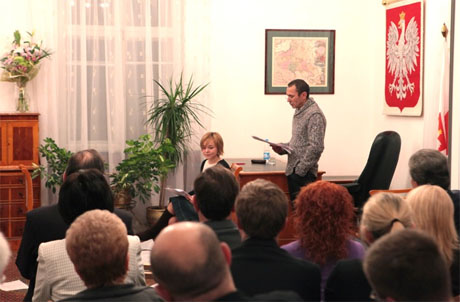
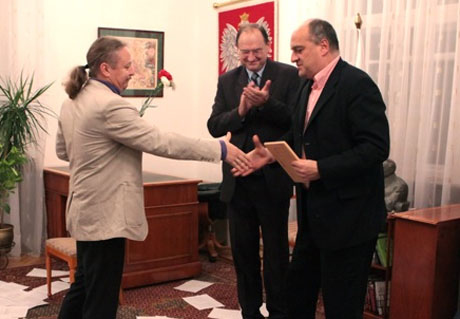
Mikalai Khalezin giving Free Theatre prize to Wojciech Tomczyk
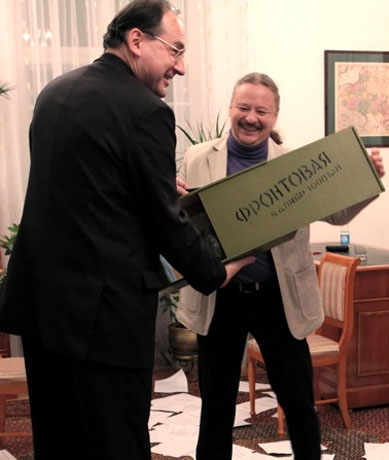
A present for Polish Ambassador Henryk Litwin from the Free Theatre
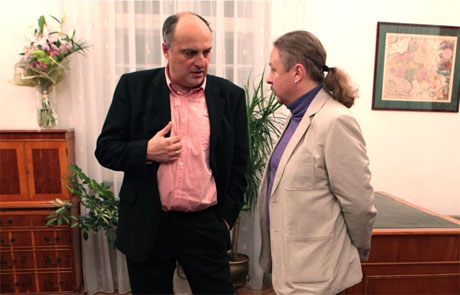
Nuremberg’s author Wojciech Tomczyk and Mikalai Khalezin
